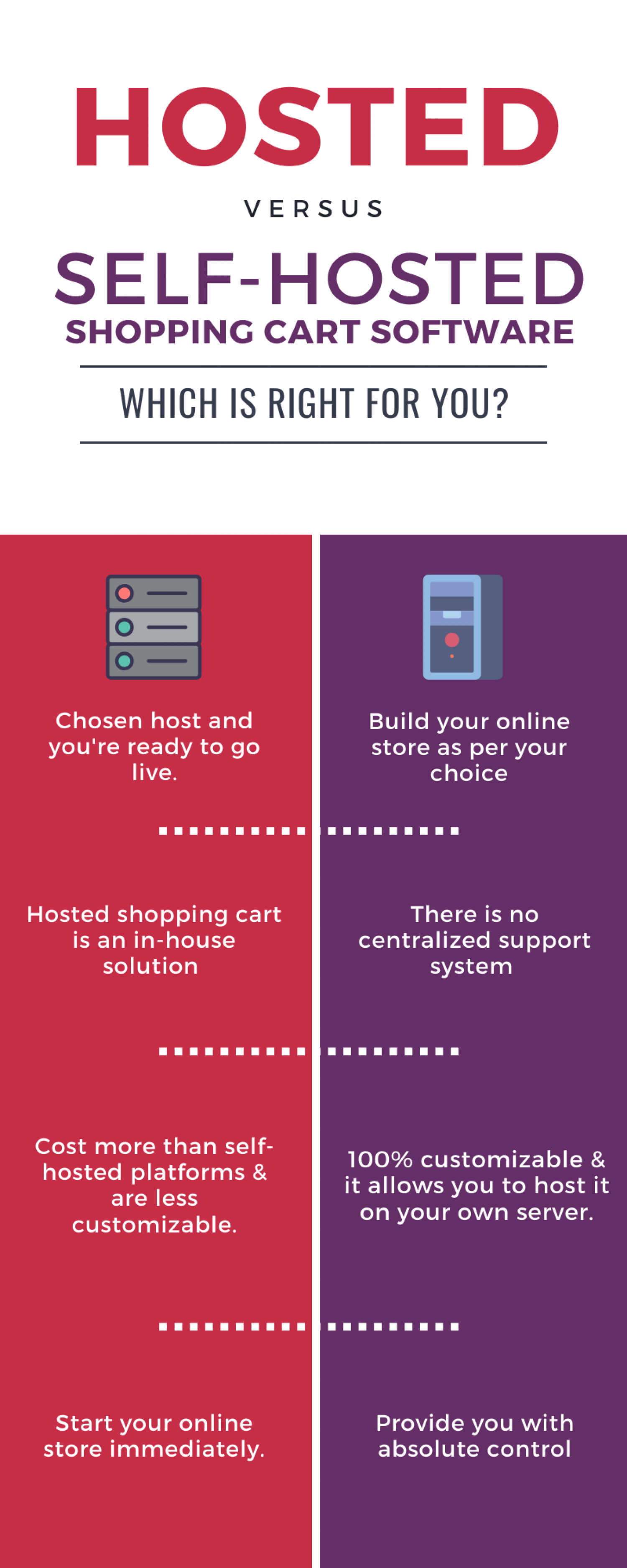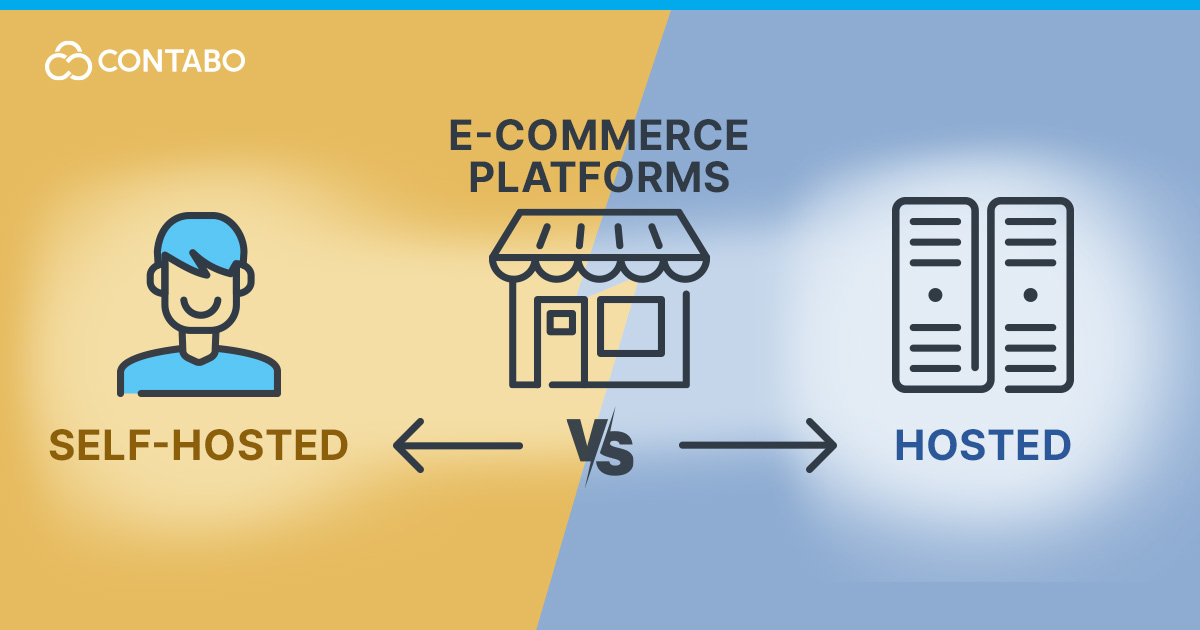Choosing the right e-commerce platform is crucial for your online store’s success. Hosted and self-hosted platforms both offer unique advantages and challenges.
Understanding the differences between hosted and self-hosted e-commerce platforms helps you make an informed decision. Hosted platforms manage everything for you, including updates and security. Self-hosted platforms offer greater control and customization but require more technical knowledge. This comparison will provide you with insights into which option suits your business needs better.
By the end of this article, you will have a clearer idea of the benefits and drawbacks of each platform type. Let’s dive into the details and help you choose the best path for your online store.

Credit: blog.shift4shop.com
Introduction To E-commerce Platforms
Welcome to the world of e-commerce! Whether you’re starting a new online store or looking to upgrade your current one, choosing the right e-commerce platform is crucial. In this blog post, we’ll explore the differences between hosted and self-hosted e-commerce platforms. This will help you make an informed decision that suits your business needs.
Importance Of Choosing The Right Platform
Why is selecting the right platform so important? Well, think of it like choosing the foundation for your house. The right foundation ensures your house stands strong and serves you well for years. Similarly, the right e-commerce platform will support your business operations, provide a seamless shopping experience for your customers, and help you grow.
Here are a few key reasons why the platform choice matters:
- Scalability: As your business grows, you’ll need a platform that can grow with you.
- Cost-effectiveness: The right platform balances features with affordability.
- Ease of use: You want a platform that’s easy to manage, even if you’re not tech-savvy.
- Customization: The ability to tailor the platform to your specific needs.
Overview Of Hosted And Self-hosted Options
Now, let’s dive into the two main types of e-commerce platforms: hosted and self-hosted. Each has its own set of advantages and disadvantages, so it’s important to understand what each option entails.
| Feature | Hosted Platforms | Self-Hosted Platforms |
|---|---|---|
| Definition | Hosted platforms are managed by third-party companies. They handle hosting, maintenance, and updates. | Self-hosted platforms require you to manage your own server, hosting, and updates. |
| Ease of Use | Generally easier to use and set up. Ideal for beginners. | Requires more technical knowledge. More control over customization. |
| Cost | Subscription-based pricing. Costs can add up over time. | Higher upfront costs but potentially lower long-term expenses. |
| Customization | Limited customization options. Dependent on the platform’s features. | Highly customizable. You can tweak almost everything. |
| Maintenance | Maintenance and updates handled by the provider. | You are responsible for maintenance and updates. |
Choosing between a hosted and self-hosted platform depends on your business needs, technical skills, and budget. In the next sections of this blog, we’ll dive deeper into the pros and cons of each option to help you make an informed choice. Stay tuned!

Credit: contabo.com
Hosted E-commerce Platforms
When it comes to launching an online store, one of the first decisions you’ll need to make is whether to go with a hosted or self-hosted e-commerce platform. In this section, we’ll dive into hosted e-commerce platforms. We’ll explore what they are, their key features, and weigh their pros and cons. By the end, you’ll have a better idea if a hosted platform is the right choice for your online business.
Definition And Examples
Hosted e-commerce platforms are solutions where the service provider manages all aspects of the software and hosting. Essentially, you rent space on their servers and use their software to build and run your online store. Popular examples include:
- Shopify – Known for its ease of use and robust app ecosystem.
- BigCommerce – Offers a plethora of built-in features and scalability.
- Wix – Combines website building with e-commerce capabilities.
Key Features
Hosted e-commerce platforms come packed with features designed to simplify the process of running an online store. Some of the most common features include:
- All-in-One Solutions: Everything you need is included, from shopping cart software to payment processing.
- Security: SSL certificates, PCI compliance, and regular updates are managed for you.
- Customer Support: Access to 24/7 support to assist with any issues that arise.
- Scalability: Easily upgrade your plan as your business grows.
- Design Templates: A variety of professional templates to create a visually appealing store.
Pros And Cons
Let’s break down the pros and cons of using a hosted e-commerce platform:
| Pros | Cons |
|---|---|
|
|
Deciding whether a hosted e-commerce platform is right for you often comes down to your technical expertise and business needs. If you’re looking for a hassle-free, quick-to-launch solution, hosted platforms are definitely worth considering. On the other hand, if you need extensive customization and have the technical know-how, you might find them somewhat limiting.
Self-hosted E-commerce Platforms
Choosing the right e-commerce platform for your online store is crucial. It can determine how easily you can manage your store, the level of customization you can achieve, and ultimately, your business success. In this section, we will dive into Self-Hosted E-Commerce Platforms, uncovering what they are, their key features, and their advantages and disadvantages. Let’s get started!
Definition And Examples
Self-hosted e-commerce platforms are software solutions that you install on your own web server. This gives you full control over your online store. Popular examples include WooCommerce (used with WordPress), Magento, and OpenCart.
Key Features
Self-hosted platforms come with a variety of features that help you create a custom online store:
- Full Customization: You can tweak every aspect of your store to match your brand.
- Scalability: These platforms can handle a large number of products and customers.
- Control Over Data: Since you host the store yourself, you have complete control over your data.
- Wide Range of Plugins: Expand your store’s capabilities with numerous plugins and extensions.
Pros And Cons
| Pros | Cons |
|---|---|
|
|
So, is a self-hosted e-commerce platform right for you? If you value customization, flexibility, and control over your store, it might be the perfect choice. However, be prepared to handle the technical aspects or have someone on your team who can manage them.

Credit: www.a2hosting.com
Cost Considerations
When choosing between hosted and self-hosted e-commerce platforms, cost considerations play a crucial role. Understanding the financial implications helps in making an informed decision. This section breaks down the cost factors involved in both options.
Upfront Costs
Hosted e-commerce platforms usually have lower upfront costs. These platforms offer a subscription model. Users pay a monthly or annual fee. This fee often includes hosting, security, and support services.
Self-hosted platforms require a higher initial investment. Users need to purchase hosting services. They must also buy a domain name. Additionally, setting up the platform demands technical expertise. This may involve hiring developers, adding to the upfront costs.
Ongoing Expenses
Hosted platforms have predictable ongoing expenses. The subscription fee covers most services. Users might incur extra costs for premium themes or apps. These additional costs are usually optional.
Self-hosted platforms have variable ongoing expenses. Users must manage hosting fees, security updates, and maintenance costs. Regular updates and backups add to the expenses. Hiring technical support can also be a recurring cost.
Customization And Flexibility
Hosted e-commerce platforms offer limited customization, while self-hosted platforms provide greater flexibility for unique designs and features. Users can tailor self-hosted solutions extensively to meet specific needs.
Choosing between hosted and self-hosted e-commerce platforms can be challenging. Customization and flexibility are key factors to consider. These aspects determine how well the platform meets your business needs. A hosted platform offers ready-made templates and tools. It is easy to set up and use. Yet, it may limit your ability to make changes. On the other hand, a self-hosted platform provides more control. You can customize every aspect of your online store. This requires more technical knowledge, but the flexibility can be worth it.Design And Layout
Hosted e-commerce platforms often come with pre-designed templates. These templates are easy to use and help you get started quickly. The downside is that customization options are limited. You may find it challenging to create a unique design. Self-hosted platforms offer more design freedom. You can hire a developer or use your own skills. Modify every detail to match your brand. This allows you to create a distinctive and memorable store.Feature Expansion
Hosted platforms usually provide essential features. These include payment gateways, inventory management, and customer support tools. Adding new features can be difficult. You depend on the platform provider to introduce updates. Self-hosted platforms excel in feature expansion. You have access to a wide range of plugins and extensions. You can add any functionality you need. This flexibility supports your growth and adapts to your changing needs. “`Technical Requirements
Understanding the technical requirements of hosted and self-hosted e-commerce platforms helps you make the right choice. This section explains the technical aspects of each.
Hosting And Maintenance
Hosted e-commerce platforms come with built-in hosting. The provider manages all server-related tasks. Users do not need to worry about server uptime or performance issues. They also handle all technical maintenance.
Self-hosted platforms require you to find a hosting provider. You must manage your server and ensure it is always up and running. Regular maintenance is your responsibility.
Security Measures
Hosted platforms include security features. They manage SSL certificates and protect against threats. Hosted platforms handle security updates and patches.
Self-hosted platforms put security in your hands. You must install SSL certificates and keep software up to date. Protecting your store from threats is your responsibility. Regular security audits are necessary.
Scalability And Performance
When it comes to e-commerce platforms, scalability and performance are paramount. You need a system that can handle your store’s growth without sacrificing speed or user experience. Whether you choose a hosted or self-hosted solution can significantly impact how well your e-commerce site manages increased traffic and future expansion.
Handling Traffic Spikes
Imagine your store is running a big sale, and traffic spikes. You want your site to stay fast and reliable. Hosted platforms, like Shopify or BigCommerce, often come with built-in scalability features. They manage server resources for you. This means you won’t have to worry about your site crashing during peak times. The hosting provider handles the technical side of things, ensuring your site remains up and running smoothly.
On the other hand, self-hosted platforms, like WooCommerce or Magento, put the control in your hands. You’ll need to ensure your hosting plan can handle increased traffic. This might mean upgrading your server or using a Content Delivery Network (CDN) to help manage load times. While this gives you more control, it also means more responsibility. If you’re tech-savvy or have a dedicated team, you can optimize your site to handle spikes effectively.
Future Growth
Planning for the future is crucial in e-commerce. Hosted platforms provide a straightforward path to growth. They offer various plans and packages that you can upgrade as your business expands. This makes it easy to scale without worrying about the technical details. Plus, you can rely on their support team to help you navigate the growth process.
With self-hosted platforms, the sky’s the limit, but so is the effort required. You have the freedom to customize and optimize your store as you see fit. Want to add more products, new features, or integrate with other systems? You can do it all, but you’ll need to manage it yourself. This can be rewarding, especially if you like having control over every aspect of your store. However, it also means you need to stay on top of maintenance, updates, and security.
In summary, both hosted and self-hosted platforms offer unique benefits when it comes to scalability and performance. Hosted solutions take the heavy lifting off your shoulders, making it easier to handle traffic spikes and future growth. Self-hosted platforms provide the flexibility and control needed to tailor your site to your exact needs, though they require a hands-on approach. The choice depends on your technical expertise and how much control you want over your e-commerce store’s growth and performance.
Support And Resources
When diving into the world of e-commerce, one of the most critical aspects to consider is the support and resources available. Whether you choose a hosted or self-hosted platform, the level of assistance and the wealth of resources at your disposal can make or break your online store’s success. Let’s take a closer look at the differences between the two, focusing on customer support and community resources.
Customer Support
Customer support is like the lifeline for your e-commerce platform. Hosted platforms typically offer robust support options. You can expect 24/7 assistance via live chat, email, or phone. This means, if you hit a snag at 2 AM, there’s someone to help. For example, Shopify offers extensive customer support to help you resolve issues quickly.
On the other hand, self-hosted platforms require you to be more self-reliant. Sure, some services might offer limited support, but mostly, you’re on your own. You might need to hire a developer or an IT expert to troubleshoot problems. Think of it like owning a car; you need to know a bit about how it works or have a good mechanic on speed dial.
Community And Documentation
When it comes to community and documentation, both hosted and self-hosted platforms have their strengths. Hosted platforms, like BigCommerce, come with a wealth of official documentation and tutorials. Plus, they often have active forums where you can ask questions and share tips with fellow users.
Self-hosted platforms, like WooCommerce, have vibrant communities and extensive documentation too. However, these resources are often created by other users rather than the company itself. This can be a double-edged sword. While you have access to a broad range of experiences and solutions, the quality and reliability of the information can vary.
Here’s a quick comparison:
| Support Aspect | Hosted Platforms | Self-Hosted Platforms |
|---|---|---|
| Customer Support | 24/7 professional support | Limited or no official support |
| Community | Official forums and user groups | User-driven forums and groups |
| Documentation | Extensive official guides and tutorials | Community-created guides and tutorials |
Choosing between hosted and self-hosted e-commerce platforms boils down to your comfort level with technology and your need for support. If you prefer having a helping hand available at all times, a hosted platform might be the way to go. But, if you’re adventurous and enjoy learning from a community, a self-hosted platform offers a rich, albeit challenging, environment.
In the end, both types of platforms have their place in the e-commerce ecosystem. It’s all about finding the right fit for you and your business.
Frequently Asked Questions
What Is The Difference Between Hosted And Self-hosted Ecommerce Platforms?
Hosted eCommerce platforms manage hosting, security, and maintenance for you. Self-hosted platforms require you to handle hosting, security, and maintenance.
What Is The Difference Between Hosted And Self-hosted?
Hosted means the provider manages everything. Self-hosted means you control and manage your own server. Hosted solutions are easier but less flexible. Self-hosted solutions offer more customization and control.
Is Shopify Hosted Or Self-hosted?
Shopify is a hosted e-commerce platform. It manages hosting, security, and updates for your online store.
What Are The Different Types Of E Commerce Platforms?
There are several types of e-commerce platforms: hosted platforms, self-hosted platforms, open-source platforms, and SaaS platforms. Each type caters to different business needs and technical capabilities. Choose based on your business requirements.
Conclusion
Choosing between hosted and self-hosted e-commerce platforms depends on your needs. Hosted platforms offer ease and support. Self-hosted platforms give you control and flexibility. Consider your budget, technical skills, and business goals. Each option has its pros and cons. Think about future growth and scalability.
Make an informed decision that aligns with your vision. Both options can help your online store succeed. Stay focused on delivering a great shopping experience.

